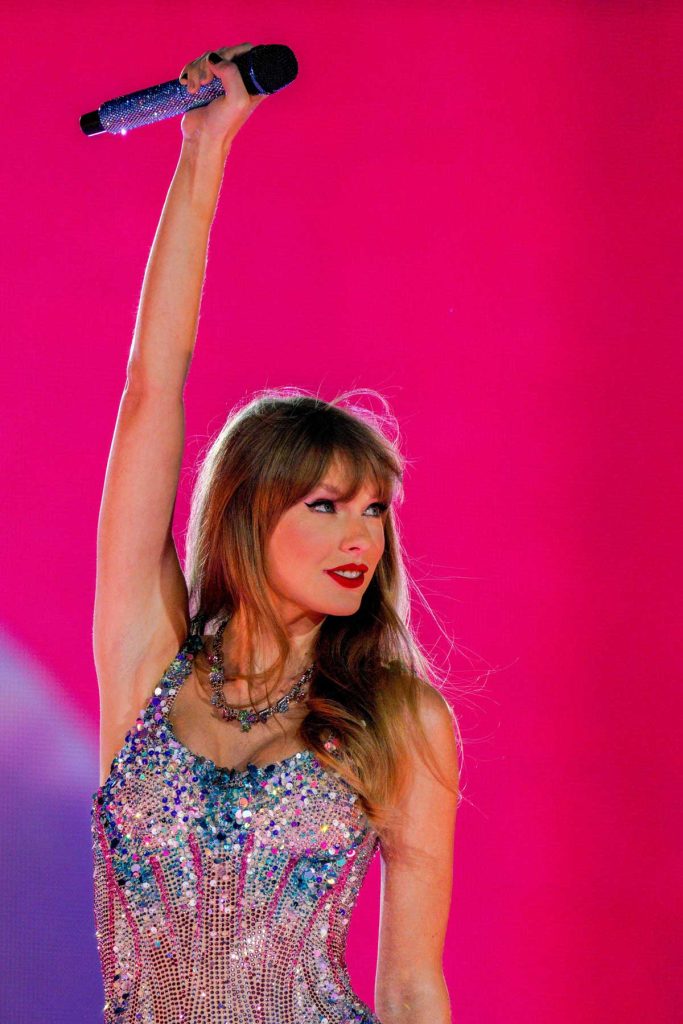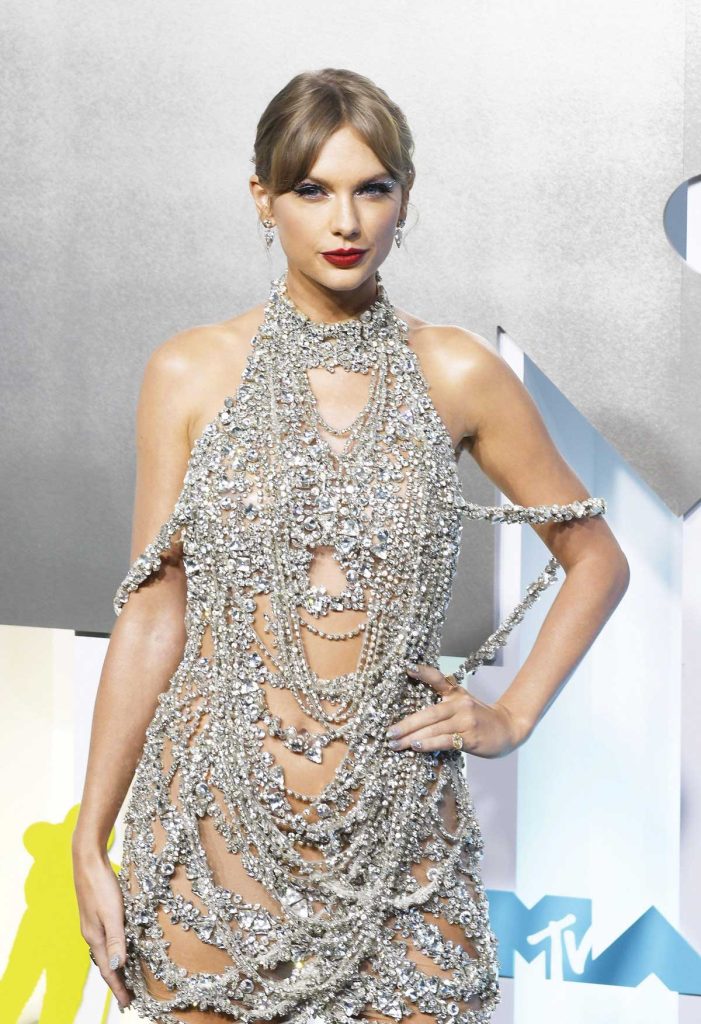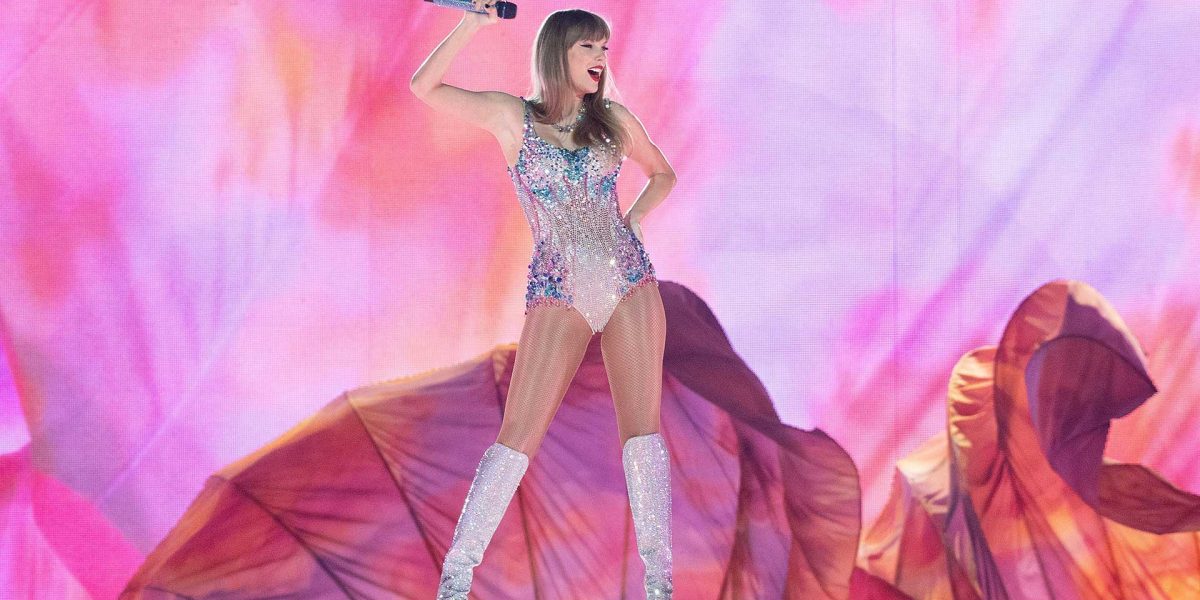Taylor Swift: Queen of the Eras
As the lights dimmed on the 69,000-strong gathering of Swifties at the State Farm Stadium in Glendale, Arizona on March 17th of this year, the excitement from the crowd was unreal. The cheers and whoops must’ve broken through to 9.9 on the Richter scale, for sure. Several spotlights swirled across the crowd and images faded in and out of frame on the screen stretching across the back of the expansive main stage.
An analogue clock had counted down the minutes-till-showtime; Dusty Springfield’s, You Don’t Own Me, played to the audience, adding to the suspense. As the lights rose and faded, rose and faded, the approaching footsteps of the main act clonked out the speakers and filled the stadium. Cla-clomp. Cla-clomp. Cla-clomp.
After a brief moment of darkness, a singular beam of light hit the stage. A door illuminated then opened slowly, and out Taylor Swift stepped to the roar of her devoted fans.
“I kind of just feel like telling you… I’ve just never been this happy in my life,” Swift told her fans in utter ecstasy, “in all aspects of my life, ever.”
It’s the stuff of dreams, really. According to the Daily Mail, The Eras Tour is going to culminate for Taylor Swift a whopping USD $4.1 billion when it concludes in December next year. That has – thanks to the surging ticket sales and ongoing success of her music – firmly given Swift a seat at the billionaires club table. She’s now got an impressive net worth of $1.1 billion.
“Taylor Swift’s tour is rewriting the playbook of entertainment economics,” Chris Leyden, director of growth marketing at SeatGeek, previously told CNN. “She’s not just a performer – she’s an economic phenomenon.”
If that wasn’t enough, the concert’s subsequent film, Taylor Swift: The Eras Tour (which was released in cinemas on the 4th of October in the United States and Canada) was also named the most profitable concert film in history. The film, directed by Sam Wrench, shows the entire concert, shot at the SoFi Stadium in Inglewood, California, and will continue to break box office records.
“If Taylor Swift were an economy,” Dan Fleetwood, President of QuestionPro Research and Insights, said to GlobalNewsWire, “she’d be bigger than 50 countries.”
Her huge economic impact is making waves (coined as Swiftonomics) to the cities hosting The Eras Tour. The GDP of each hosting city she visits globally sky-rockets. It’s no surprise it’s been lauded as one of the greatest tours of all time, created by one of the world’s greatest performers.
According to Forbes, she is the 15th celebrity to don the billionaire moniker. Unlike many others in the illustrious list, she is only amidst a few others who have created their empire without a profitable side-hustle. Rhianna, for example, who joined the billionaires club in 2021, generates most of her wealth (at an estimated $1.7 billion) through her Fenty brand. Or hip-hip star, Jay-Z in 2019, owns streaming-service, Tidal, and cognac brand, D’Ussé. Taylor has paved a unique way for herself, through her music.
“Taken together, Swift Inc. is essentially a multinational conglomerate with the world’s most devoted customer base, its most charismatic CEO, and significant economic power,” Bloomberg said of Taylor earlier this year.
Despite also battling numerous obstacles along her expansive career, Taylor Swift has proven to be a business-savvy artist with a strong brand and empire. Her name has grown to dizzying heights through her extensive discography, five homes, and earnings from streaming deals, music sales, concert tickets, and merchandise, according to Bloomberg. And if that’s not enough, she also has a pretty impressive real estate portfolio worth $150 million as of 2023 with properties in Nashville, New York, L.A. and Rhode Island.
Twelve Grammys, the most wins at the Teen Choice Awards, iHeartRadio Music Awards, and the AMAs, to name but a few. Ten highly successful studio albums – as well as four re-recorded albums, five EPs, and four live albums. Taylor Swift truly sits at the pinnacle of success, alright, through her cultural dominance and entrepreneurial candour. She certainly is the queen of every era she has dominated.

“I was born in 1989,” Swift wrote on social media after getting the invitation to the billionaires club, “reinvented for the first time in 2014, and a part of me was reclaimed in 2023 with the re-release of this album I love so dearly. Never in my wildest dreams did I imagine the magic you would sprinkle on my life for so long.”
On the opening night of The Eras Tour, the multi-award-winning, platinum-selling superstar, Taylor Swift stood – confident, strong, fearless – and addressed her devoted legion of fans and kept them captivated, awed, and wandered through three hours of her best and most-loved hits. A set-list of 44 songs. Ten distinct conceptual acts that each highlight every award-winning, marvellous album throughout her wildly successful career. Each act, her eras.
It’s all a testament to the fact that Swift continues to reinvent herself numerous times, over and over, changing the style of her music and fashion across multiple genres. Born in 1989 in West Reading, Pennsylvania to a former stock-broker dad and homemaker mum, the young Tay-Tay spent her early years on a Christmas tree farm and found her way to music through following her dreams of becoming a country singer. Her first era, no doubt. After the family moved 1,255 kilometres away to the Music City of Nashville, Tennessee, the young Swift was drawn to what the bright lights and razzmatazz of show business could bring her. The family had moved (thanks to her dad’s departure from stock broker to financial advisor for The Swift Group, under Merrill Lynch) for Taylor to follow her dream as a singer.
“I never wanted to make that move about her ‘making it,’” Andrea, Taylor’s mum, told EW in 2008. “Because what a horrible thing if it hadn’t happened, for her to carry that kind of guilt or pressure around.”
Thank God it did. Because it was whilst playing at the 90-seat music club, Bluebird Cafe, that Taylor caught the attention of DreamWorks Records executive, Scott Borchetta, who was on the lookout for new talent to start independent-label, Big Machine Records. He immediately gravitated towards Taylor and made sure to get her signed up straight away. With Borchetta, Swift released her first album, Taylor Swift, in 2006, which peaked at number five on the US Billboard 200 on which it spent 157 weeks – the longest stay on the charts in the 2000s. Insane for a young Taylor just starting out. Whether it be the damn good storytelling on the album or her being portrayed as “America’s Sweetheart”, the album really resonated with fans alike.
Here, the marketing of Taylor Swift started to take shape. She had already started to brand herself as a likeable, sweet, and cute character in her early career (with sometimes a quirky, relatable side). Her image offered fuel to her songs and storytelling – hits that reportedly were written by her own hand on her bedroom floor. Her appeal to a diverse and extensive audience began. The moments of metamorphosis feel genuine, allowing young fans to “grow up” with her, experiencing the same growing pains put into song along the way.
“My first album is the diary of when I was 14, 15, 16,” Swift said to NPR back in 2012. “My second album, Fearless, was from 16 to 18, and so on, and so on.”
As Swift continued to release music and her sound started to evolve, her brand also started changing. She began to experiment with a more pop-oriented sound while still maintaining her country roots. Her next album, Fearless, was released in 2008 and started to push the boundaries from country music to pop.
The acclaim for Swift’s new album was widespread, and the songs – “Forever And Always”, “Fifteen”, and “You Belong With Me” – helped her win four Grammys in 2010, when Taylor became the youngest artist ever to win the Album Of The Year award. She was also the youngest artist ever to win Entertainer Of The Year at the Country Music Association Awards and claimed two American Music Awards.
Fearless was also named Album of the Year and made Swift the youngest solo artist to receive the much coveted award.
“I’m so glad I took two years to make the second album,” Taylor said to iTunes in 2008. “I experienced two years’ worth of life and meeting people, and getting let down, and people promising you things that they don’t follow through with, and watching people and reflecting on things. I’m just so glad there was that amount of time where I could grow up.”
It was whilst accepting an award at the 2009 VMAs when her song, “You Belong With Me” from Freedom won the Best Female Video award, that her first major celebrity incident occurred. Everyone knows of the incident, so we don’t need to go into too much detail. In the wake of the event, many flocked to Taylor’s defence, especially on social. Beyoncé even, when she took the stage to accept the award for Video of the Year later that night, invited Taylor back up for her to have her moment. Reportedly, after the awards concluded, they both burst into tears backstage.
Over the years, word from the feud often springs up online. One of the most notable was when Kanye released his 2016 album, The Life of Pablo, which featured a little ditty called “Famous”. On the track, the line, “I feel like me and Taylor might still have sex / Why? I made that b***h famous” features. What a poet West is. Apparently, Kanye said that Taylor had okayed it. Logic and any common sense would state that she didn’t. Swift denounced the song upon its release, taking issue with being called a b***h and West taking credit for her success. Taylor (in true Swift fashion) fired back with the song “Innocent” in her next album, Speak Now.
No matter the obstacles that stood in her way as a result of this era of her life, Taylor has learnt some very good lessons that she uses today as a billionaire businesswoman playing sold-out show after sold-out show on her The Eras Tour. She always seems to take the high road. Whether it is an acceptance speech or a tweet, she always reflects on it with maturity and integrity.
The success she saw after the release of her 2010 album was immense. More awards. Downloads that almost broke the internet – it became the fastest-selling album of all time with 270 million downloads in the first week, according to the Guinness Book of Records.

Since that incident in 2009, it would be a rare occurrence that Taylor Swift would ever insert herself, knowingly and full-force, into public controversy, unless she was fighting for a cause she really cared about. She’s always been so headstrong and powerful in her message to her swarm of fans.
Her music is her baby, and she will do everything in her power to grow her business, scale it, give her audience what they want, and stay genuine in the process. It is also Taylor’s unrelenting passion for fellow artists that sets her apart from others. Taylor Swift has always been one for challenging the “big man” and fighting for what’s right for the artist.
An example of when Swift stood up for her artistic rights was in 2019 when Swift came into dispute with Kanye West’s best buddy, Scooter Braun – the new owner of Big Machine Records (which she had left in 2018 for Republic Records), with Scott Borchetta still at the helm as CEO – who had obtained ownership of the first recordings of her first six albums. That’d be an estimated USD $300 million. There are stories online of how Swift was even denied singing her own older songs (ones she had written herself, may I add) at award ceremonies or on movie soundtracks.
Scott (having known Tay-Tay since the very beginning of her career) rushed to Braun’s defence and tried to power-trip Swift with bullying tactics. As Taylor continued to show her displeasure for not being able to own her own music, she was offered an alternative by the company, a “gag-order” where she would be able to take ownership of her own material but only if she never spoke publicly of the ordeal. One assumes right that Swift didn’t take too kindly to having her own work kept from her, so held two fingers up at the businessmen and consequently laid bare the inner-workings of the industry.
“All I could think about was the incessant, manipulative bullying I’ve received at his hands for years,” she said. “…Now Scooter has stripped me of my life’s work, that I wasn’t given an opportunity to buy. Essentially, my musical legacy is about to lie in the hands of someone who tried to dismantle it. He knew what he was doing; they both did. Controlling a woman who didn’t want to be associated with them. In perpetuity. That means forever.”
In an interview with CBS’ Tracy Smith, Swift announced her plans on how she was going to sidestep Braun. Inspired by advice given to her by fellow singer, Kelly Clarkson, Swift took to work re-recording her older albums. Of her ten studio albums to date, four have been rerecorded (Fearless, Red, Speak Now, and 1989) by Republic, giving her back full ownership of her past work. Her calls for help on social media have made fellow musicians and fans aware of the artistic rights and what they should really look out for in their contracts and truly laid out the blueprints of reclaiming work from profiteering labels.
“There’s a different vocabulary for men and women in the music industry, right?” Taylor told Jane Pauley on Sunday Morning in 2019. “A man does something, it’s strategic. A woman does the same thing, it’s calculated. A man is allowed to react. A woman can only overreact.”
Talking about social media, we wouldn’t be the first to say that Taylor knows how to spin a good social media post. I mean, she’s a powerhouse. 94.8 million followers on Twitter. 227 million on Instagram. She is next to legendary for dropping multiple tiny pieces of hype about a new album drop.
She certainly changed the music industry with the engagements she has with her fans. As well as being a musical superstar, she’s also a social media genius. Swift’s universal appeal is heightened greatly by her fan engagements. She’s forever heading to social media to share the inspirations behind her narratives and the worlds she builds through her songwriting. The evolution of her career from country singer to pop icon has inevitably caused her to reinvent herself time and time again through that posting.
When Swift promotes an album, listeners know it’s going to be a mixture of merch deals, promotions, and even secret listening parties at her house. Even when the 2020 Covid-19 pandemic hit and Swift released a surprise album in isolation, her social media promotion and sales continued being wildly impressive. A masterclass, if anything, in market strategy. As soon as the album was announced, her online store was equipped with digital and physical copies of the album, all available for pre-order, including eight different versions of the vinyl copy.
For the next decade, Swift released seven completely earth-shattering albums and won numerous awards because of it. She’s dabbled in multiple genres along the way. Interchanging her ten albums between country, pop, and alternative musical styles, Swift has reached many different audiences with her self-written, personal songs.
When you look at the success she’s achieved over her lifetime and the loyalty she’s shown to her fans along the way, it’s nothing but impressive. Based on the culmination of her finances, Swift will likely take the top spot completely as the highest-grossing tour ever, claiming the position from the current holder Elton John whose Farewell Yellow Brick Road Tour grossed over $900 million with 330 shows. She’s a walking-talking economy too, with her impact of her very being causing insane hype.
Looking at Taylor Swift’s success and worldwide acclaim – gaining entry into the billionaires club and continuing to wow audiences around the globe with sold-out shows – Swift’s devotion to her art, image, and brand is unprecedented, comparable to no other in the industry. She’s a superstar through and through. Her passion is music, and every era of her wonderful career has glistened. She’s certainly the Queen of the Eras.

